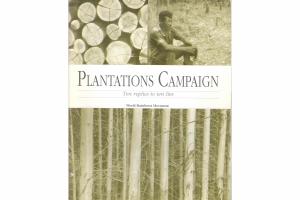Following an existing trend at the global level, oil companies in Argentina have enthusiastically embraced the idea of entering the carbon permits market, as an effective way to increase their profits and revamp their image to the eyes of public opinion: from the bad guys responsible for global warming to champions of forest conservation!
The Green Economy
The Green Economy is a tactic used to “clean up” the image of corporations rather than address corporate capture and capitalism as the true drivers of deforestation. False solutions promoted under the Green Economy include certification, sustainable forest management, ecosystem services, REDD+, the bioeconomy, nature-based climate solutions, and zero net deforestation. Rather than stopping it, these “solutions” support corporate-driven destruction that is causing a deep social and ecological crisis.
Other information
18 June 2000
The expansion of tree monocultures in Tasmania -which is paradoxically the centre of origin of Eucalyptus globulus, one of the most widely used species for establishing monocultures throughout the world- under the Clean Development Mechanisms of the Kyoto Protocol is provoking widespread concern in Australia.
Bulletin articles
18 May 2000
Meeting in Moruya over the weekend the National Forest Summit, Australia's major body representing forest campaign groups, has roundly condemned the federal Government's push for an Australian Forestry Standard in the face of growing calls for "certified" wood.
Internationally, consumers are demanding wood products that can be certified as having been sourced from forests that have been managed sustainably. The most well known of these management standards is that developed by the Forest Stewardship Council, which has now certified over 18 million hectares worldwide.
Bulletin articles
20 January 2000
The issue of the environmental services that Southern countries can provide to Northern countries to mitigate the effects of global climate change is controversial. On the one hand there is the question of environmental justice at the global level, since those countries that are most responsible for the dangerous alteration of climate on Earth, instead of addressing the causes that are provoking it -for instance the unsustainable energy use and the huge emissions of CO2 by industry- are looking for doubtful and partial solutions, that can be bought for a low price in the South.
Bulletin articles
20 December 1999
Several NGOs -among them the Borneo Resources Institute (BRIMAS), Sahabat Alam Malaysia (Friends of the Earth), SACCESS, Keruan Association Sarawak, Centre for Orang Asli Concerned (COAC) and EPSM/CETDEM- took part at the first consultative meeting of the Malaysian National Timber Certification Council (NTCC) which took place from 18-21 October, 1999, in Kuala Lumpur.
Bulletin articles
20 November 1999
Last September Canada reached a controversial deal to "buy" oxygen from Honduras within the framework of a "debt for nature" swap and the Clean Development Mechanisms of the Kyoto Protocol. CIDA (Canadian International Development Agency) will "forgive" about U$S 680,000 of Honduras' U$S 11 million debt with Canada. In exchange, a so-called joint implementation office will be established in Honduras to promote tree plantations and monitor forest conservation programmes in that country.
Bulletin articles
20 November 1999
The following letter is being circulated worldwide by a large number of Australian NGOs:
"We the undersigned representatives of Australian conservation NGOs are writing to you to express our opposition to the approach taken by our Federal Minister for Forestry and Conservation, Mr. Wilson Tuckey, to regulate independent forest certification schemes at the international level.
Other information
20 November 1999
The "environmentally concerned" French car producer Peugeot, decided to do something about the global warming effect of the millions of cars it produces. Of course, nothing as radical as switching to a different source of fuel. Instead, it decided to go the easy way: to plant "carbon sequestering" trees in the state of Mato Grosso in Brazil. The project began to be implemented last year, with the aim of converting 12,000 hectares of "degraded" pastures into plantations.
Other information
20 November 1999
The promotion of tree plantations as a means of combating global warming has received all kinds of criticism. On the one hand, plantations do not relieve pressures from forests -which are carbon reservoirs- but constitute a direct cause of their destruction. According to a satellite image analysis, in the 1980s, 75% of the new tree plantations in Southern countries in the tropics were made by replacing natural forest that had existed there ten years earlier.
Bulletin articles
20 October 1999
Japan's Tokyo Electric Power Co. (Tepco) has recently signed a letter of intent to participate in a tree plantation project promoted by the state agency State Forests of New South Wales, Australia, allegedly as part of its efforts to tackle global warming. New South Wales established a legal right last November on carbon sequestered from plantations. State forestry bodies in Australia have been looking to market their projects as sinks in the newly created "carbon offsets market" by the Kyoto Protocol. Such initiative is not the only one in the push of Australia to enter this market.
Bulletin articles
27 October 1998
Deforestation and forest degradation worldwide have been and are cause of concern. Rates of loss in tropical as well as in temperate and boreal areas are alarming. All tropical forests have suffered an increase in the rate of deforestation, while the few remaining primary temperate forests, as well as boreal forests are under severe threat.

